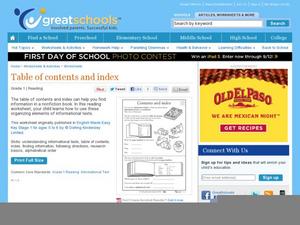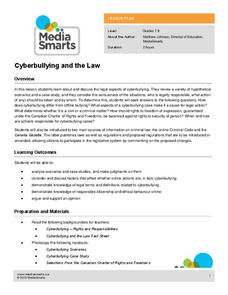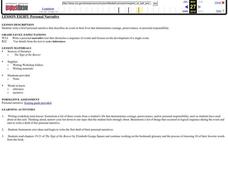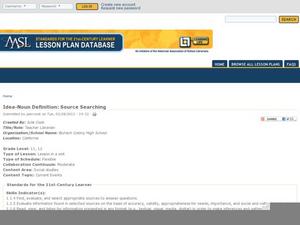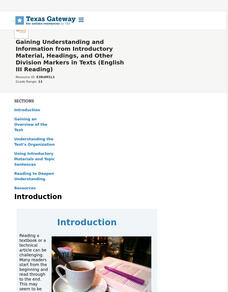National Council of Teachers of English
Timelines and Texts: Motivating Students to Read Nonfiction
With the emphasis on incorporating more nonfiction in language arts classes the question arises about how to design activities that motivate kids to engage with informational text. How about an assignment that asks class members to...
Curated OER
Nonfiction Books: Table of Contents and Index
How do you find what you're looking for when reading a nonfiction book? Even first graders can learn how to use a table of contents and an index. They use the provided images of each to locate information and answer nine questions.
Curated OER
Let's Learn Library Language
This PowerPoint presentation provides a review of 'library language', vocabulary associated with books and the library such as cover, title, author, illustrator, call number and fiction/nonfiction. Each slide of this PowerPoint displays...
Curated OER
Lesson Six: Nonfiction Text Elements (Part One)
Students examine nonfiction text elements in preparation for writing a nonfiction book about Lewis and Clark. In this social studies/language arts lesson, students discuss the term research and complete a cluster map. Additionally,...
Media Smarts
Bias in News Sources
As young consumers of media, it is important for high schoolers to explore concepts of bias and prejudice, and how they may be present in media. After discussing ideological messages that media can contain, individuals complete a warm-up...
Curated OER
All About Our Town
Pupils explore brochure writing. They work in groups to brainstorm and categorize important places in their community. In addition, they gather information from the Internet, take pictures using a digital camera, and create a community...
Curated OER
Contents and Index
It's important for your readers to understand features of informational text such as index and table of contents, so give them this visual activity to get started. They read a brief explanation of informational text, then look at an...
Roseburg Public Schools
Library Skills and Literature
The library is such a valuable resource for kids of all ages. Help elementary readers learn all about parts of the library, text features for both fiction and nonfiction text, and different ways to find books that they want to read.
Curated OER
Bias and Crime in Media
Critical thinking and social justice are central themes for this resource on bias and crime in media. The class views and discusses an incisive PSA that highlights assumptions based on race. Small groups read newspaper opinion pieces...
Media Smarts
Cyberbullying and the Law
Dealing with the very topical subject of cyberbullying, this lesson plan will surely create some engaged discussion in your classroom. Young learners discuss the laws concerning cyberbullying in Canada, and then respond to a series of...
Media Smarts
Media Awareness Network: Hate or Debate?
Discuss the difference between legitimate debate on a political issue and arguments that are based on hate through a science-fiction scenario that shows how a controversial issue can be discussed in both ways. Then learn how purveyors of...
Media Smarts
The Newspaper Front Page
Hot off the presses! A perfect instructional activity idea for a journalism class or even a language arts class looking to incorporate some informational texts. Young writers analyze the front pages of various newspapers to determine the...
Curated OER
Organizing Information into an Outline
Learners explore outlines. In this nonfiction comprehension and study skills instructional activity, students complete a traditional outline for the book Animal Homes by Ann O. Squire following guided instruction as the teacher models...
Curated OER
Personal Narrative
Young scholars explore personal stories by investigating narrative writing. In this nonfiction writing lesson plan, students participate in a workshop in which they write three events from their own life. Young scholars write first...
Curated OER
Lesson 3: Encyclopedias
After being introduced to non-fiction texts, second graders meet a different type of non-fiction text that can help them locate factual information. They discuss and examine all of the features found in typical encyclopedias such as,...
Curated OER
Research
This research PowerPoint provides questions to consider when selecting a research topic. Emerging writers consider their purpose for writing and the audience they are writing for, and then practice narrowing down a topic given a list of...
Curated OER
Planning A Vacation Online
If you could travel anywhere in the United States, where would you go? Use this question to interest your fourth, fifth, and sixth graders as they experiment with Mapquest or other direction-based resources. They choose where they'd like...
Curated OER
Idea-Noun Definition: Source Searching
A great idea for showing language arts pupils the universality of themes, even in the real world! Have class members choose an idea-noun (peace, justice, war, love, etc.) at the beginning of the year or semester. They complete weekly...
Curated OER
Doing Dewey Decimal
Learners examine the Dewey Decimal System and locate books in the nonfiction section. They examine a shelf of books and try to determine how the books are arranged, then watch a short video "Media Mania." Students then match construction...
Texas Education Agency (TEA)
Gaining Understanding and Information from Introductory Material, Headings, and Other Division Markers in Texts (English III Reading)
All teachers are teachers of reading! The 13-part interactive series ends with a lesson that teaches learners (and their instructors) how to approach reading their textbooks. After learning about several strategies, users test their...
Curated OER
Identify the Parts of a Newspaper features of informational text, newspaper format
Young readers make sense out of the wealth of information in newspapers with this helpful reference document. Pointing out basic features like headings, articles, bylines, and captions this resource is a great tool for introducing...
American Press Institute
In the Newsroom: The Fairness Formula
Reporting the news is easy, right? Think again! Show young scholars the difficult choices journalists make every day through a lesson that includes reading, writing, and discussion elements. Individuals compare the language and sources...
Newsela
Understanding "A Long Walk to Water"
What is the secret to success? Scholars use close reading of a variety of articles to determine characteristics of people that overcame hardships to become successful. While reading, pupils annotate their copies, make claims, and...
K20 LEARN
Unlocking Answers: Keys to Great Research
Successful searches for information require more than just a device with Google access. Young researchers learn how to use keywords and hashtags, as well as how to evaluate sources and how to paraphrase without plagiarizing in a fun...
Other popular searches
- Nonfiction Book Reports
- Nonfiction Text
- Summarizing Nonfiction
- Fiction and Nonfiction
- Fiction or Nonfiction
- Nonfiction Reading
- Nonfiction Text Features
- Nonfiction Text Structure
- Nonfiction Books
- Nonfiction Reading Skills
- Nonfiction Writing
- Nonfiction Literature








